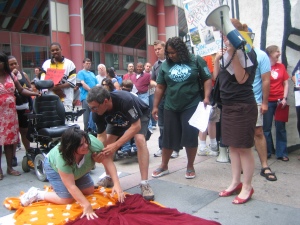Earlier this week, journalism students with Medill Reports interviewed a few Access Living Staff about the impact of the Illinois budget on the independence of people with disabilities. The story ran on Wednesday evening on the Northwestern News Report, an Evanston cable access station. Here is a video link to the story . The video is not captioned. Below is a transcript.
Medill Repots — DHS Budget Cuts Script, July 2010
Anchor
Monday will mark the twentieth anniversary of the Americans with Disabilities Act, but the Illinois budget for disability services is being slashed. Josh Lederman talks to some of those who will be affected.
***Roll Video***
KIMBERLY PETERS KNOWS JUST WHAT IT MEANS WHEN THE STATE CUTS BACK. THE FORTY-EIGHT-YEAR-OLD RESIDENT OF ELMWOOD PARK HAS MULTIPLE SCLEROSIS, AND RELIES ON IN-HOME ASSISTANCE FOR THINGS THAT MOST PEOPLE TAKE FOR GRANTED.
Kimberly Peters
“I wasn’t sure how I was going to make it.”
LAST OCTOBER, PETERS’ IN-HOME HELP WAS REDUCED FROM EIGHT HOURS A DAY TO FIVE.
Kimberly Peters
“That scared me to death. I thought, ‘That’s going to mean that I can get up out of bed in the morning, and I can go to bed at night, and not a whole lot in between.”
PETERS WAS LUCKY — SHE APPEALED AND WAS ABLE TO GET BACK MOST OF WHAT SHE LOST. BUT OTHERS IN HER POSITION MAY NOT BE AS FORTUNATE.
IN AN ATTEMPT TO NARROW A BUDGET GAP OF AROUND 13 BILLION DOLLARS, EARLIER THIS MONTH GOVERNOR QUINN CUT 1.4 BILLION FROM NEXT YEAR’S BUDGET. 312 MILLION OF THAT CAME FROM THE DEPARTMENT OF HUMAN SERVICES.
ACCORDING TO THE GOVERNOR’S OFFICE, 50 MILLION WILL BE CUT FROM OPERATIONS AND 262 MILLION FROM GRANTS. THOSE GRANT CUTS WILL TARGET NON-MEDICAID PROGRAMS THAT DON’T BRING FEDERAL DOLLARS INTO THE POT.
THEY’LL ALSO MEAN EXTENDED PAYMENT CYCLES FOR SERVICE PROVIDERS AND REDUCED ELIGIBILITY FOR MENTAL HEALTH, DISABILITY AND REHABILITATION PROGRAMS.
Rachel Siler
“In order to survive, I need these hours. And it’s an injustice to take it away.”
BOTH THE GOVERNOR’S OFFICE AND THE DEPARTMENT OF HUMAN SERVICES DECLINED TO GO ON CAMERA TO EXPLAIN HOW THE CUTS WILL BE IMPLEMENTED. BUT IN A STATEMENT THIS MORNING, THE DEPARTMENT WROTE…
“DHS is committed to keeping core services funded… The budget is not yet final. DHS is working on a Budget Implementation Plan and the contracts and funding amounts are estimated.”
Rachel Siler
“The lawmakers, they have no idea what we do and how much it means to us.”
Josh Lederman\Northwestern News Report
“As state officials and interest groups struggle to divide up what’s left of the Human Services budget, disability advocates say they’re left competing with other valid community needs, like mental health.”
Amber Smock\Advocacy Director, Access Living
“That encourages the disability community to fight over their slices of the pie. That’s not ok. We cannot stand for a ‘divide and conquer’ strategy. We have to fight together.”
DISABILITY ADVOCATES ARGUE THE STATE WILL END UP SPENDING MORE MONEY ON THE DISABLED –NOT LESS — IF CUTS TO IN-HOME AND COMMUNITY-BASED CARE FORCE DISABLED PEOPLE INTO COSTLY INSTITUTIONS. THEY SAY THERE’S ONLY ONE WAY TO ADDRESS THE BUDGET CRUNCH: RAISE TAXES.
JOSH LEDERMAN, NORTHWESTERN NEWS NETWORK.
***End Video***
Anchor
THERE MAY BE EVEN MORE CUTS TO THE DEPARTMENT OF HUMAN SERVICES IF THE STATE LOSES OUT ON 750 MILLION DOLLARS OF FEDERAL MEDICAID DOLLARS THEY’VE BEEN COUNTING ON.





